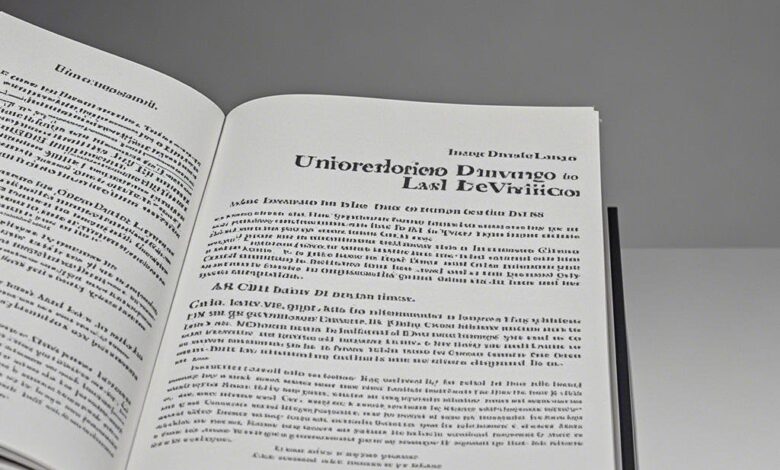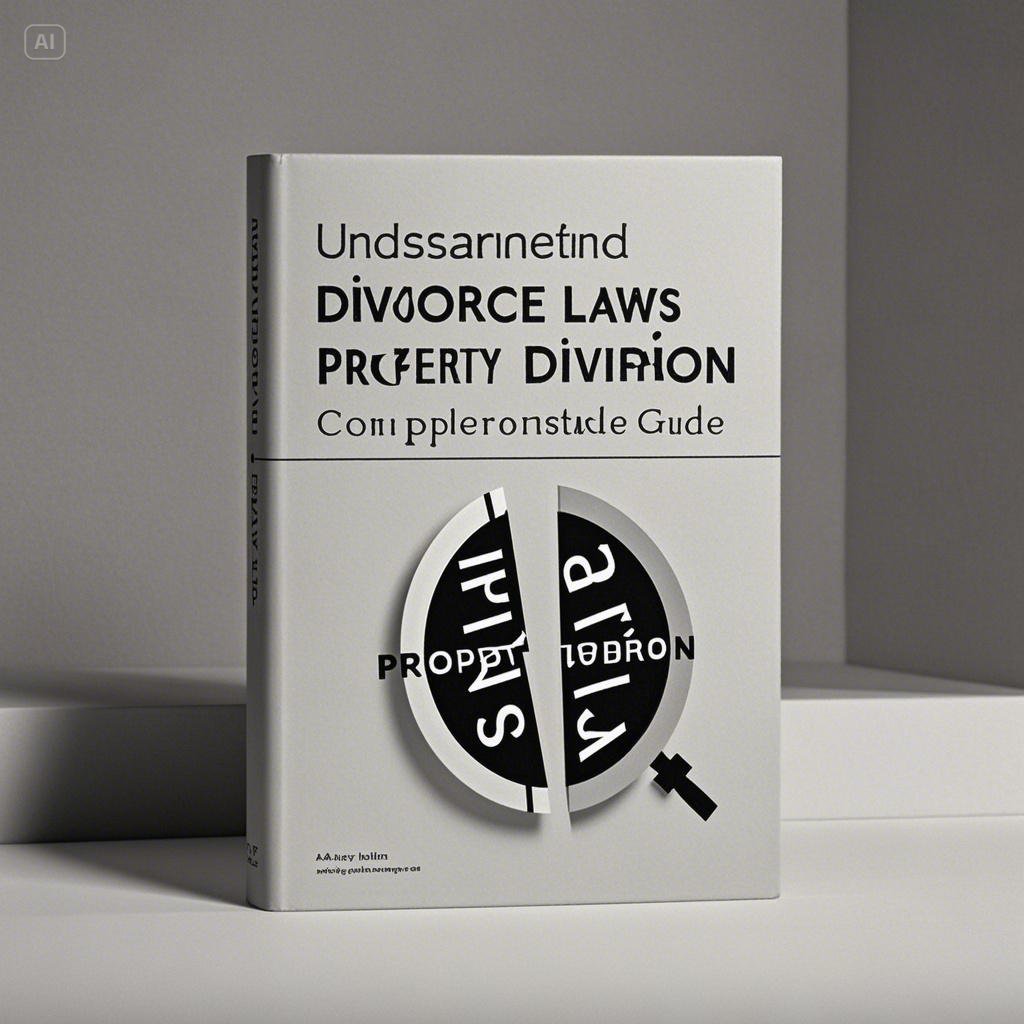Understanding Divorce Laws and Property Division: A Comprehensive Guide

Divorce is a painful event that individuals may experience, and dealing with it requires a deep understanding of the laws and procedures followed. Among the most important aspects to consider during a divorce is the division of property, which requires knowledge of the rights and obligations of each party. In this comprehensive guide, we will discuss in detail divorce laws and how to divide property, with the aim of providing a clear and simplified understanding of these important procedures.

Divorce and property division laws vary from country to country, and even within the same country, they may differ between courts. Therefore, it is necessary to consult a lawyer specialized in family law to understand the laws applicable in your area and to ensure that your rights are protected. You should also collect all information and documents related to your property to facilitate the division process.
Different Types of Divorce
Types of divorce vary depending on the reasons and procedures followed. It is important to understand these different types to determine the appropriate action for your situation. Here are some common types of divorce:
- Divorce by Mutual Consent: This type of divorce is carried out by agreement between the spouses to end the marriage, divide property, and arrange for child custody.
- Divorce for Harm: This type of divorce is initiated at the request of one spouse, due to the harm caused by the other party, such as violence or neglect.
- Divorce for Discord: This type of divorce occurs when the continuation of marital life becomes impossible due to constant disputes between the spouses.
- Arbitrary Divorce: This type of divorce is carried out by the husband without a legitimate reason or legally acceptable justification.
- Khula: This type of divorce is initiated at the request of the wife, in exchange for waiving some of her financial rights.
- Annulment: This type of divorce occurs due to a defect or legal or Sharia impediment in the marriage contract.
You should remember that each of these types has different procedures and conditions, so it is essential to consult a specialized lawyer to determine the appropriate action for your situation.
Understanding Property Division Laws
Property division laws vary from country to country, but there are some basic principles that most legal systems share. It is important to understand these principles to determine your rights and obligations in a divorce. Here are some basic concepts in property division laws:
- Joint Property 📌This is the property acquired by the spouses during the marriage and is considered joint ownership between them.
- Separate Property 📌This is the property owned by one spouse before the marriage, or acquired during the marriage through gift or inheritance.
- Equal Division 📌In some legal systems, joint property is divided equally between the spouses upon divorce.
- Equitable Division 📌In other legal systems, property is divided equitably, taking into account the specific circumstances of each case.
- Spousal Support 📌The wife may be entitled to spousal support after divorce if she is unable to support herself.
- Child Support 📌The father is obligated to pay child support after divorce to contribute to providing for their basic needs.
- Custody 📌The party who will take custody of the children after the divorce is determined, taking into account the best interests of the children.
- Visitation Rights 📌The non-custodial parent has the right to see the children and check on them, according to the agreed arrangements.
You should remember that property division laws are complex and require a deep understanding of the laws and procedures followed. It is necessary to consult a specialized lawyer to determine your rights and obligations accurately.
Steps for Property Division
The procedures for dividing property vary from case to case, but there are some basic steps that must be followed in most cases. Here are some steps you can take to divide property fairly and correctly:
- Collect Information and Documents Start by collecting all information and documents related to your property, such as real estate, vehicles, bank accounts, shares, etc.
- Evaluate Property Evaluate all your property to determine its fair market value.
- Negotiate with the Other Party Try to negotiate with the other party to reach a fair agreement on property division.
- Mediation If you are unable to reach an amicable agreement, you can resort to mediation to help resolve disputes.
- Litigation If mediation is unsuccessful, you can resort to the court to divide the property legally.
- Register the Agreement After reaching an agreement, it must be registered legally to ensure its implementation.
- Follow-up on Implementation After registering the agreement, make sure it is implemented correctly and adhere to all your obligations.
Remember that dividing property can be a complex and lengthy process, so it is necessary to be patient and persevering and to cooperate with your lawyer to ensure that you obtain your rights.
Tips for Dealing with Divorce
Divorce is a difficult and painful experience, but there are some tips that can help you deal with this stage better. Here are some important tips:
You should remember that divorce is the end of a marital relationship, but it is not the end of your life. Try to focus on your future and make new plans to achieve your goals. Do not hesitate to seek support and assistance from friends, family, and specialists, and do not try to face this stage alone. Take care of your mental and physical health and engage in activities that help you relax and relieve stress. Be positive and optimistic, and remember that there is always hope for a better future.
Dealing with divorce requires strength and patience, but with proper planning and appropriate support, you can overcome this stage successfully.
The Impact of Divorce on Children
Divorce has negative effects on children, so it is necessary to do your best to protect children from the devastating effects of divorce. Parents must cooperate together and put the best interests of the children first when making any decision. Parents must avoid speaking negatively about the other party in front of the children and provide a safe and stable environment for them. It is also necessary to communicate with children openly, listen to their feelings and needs, and provide the necessary psychological support for them.
- Open Communication👈 Parents must communicate with children openly and frankly and explain to them the reasons for the divorce in a way that is appropriate for their ages.
- Avoid Conflict in Front of Children👈 Parents must avoid conflict in front of children and resolve disputes away from them.
- Provide Stability👈 Parents must provide a stable environment for children and avoid changing their daily routines significantly.
- Provide Psychological Support👈 Parents must provide the necessary psychological support for children and help them express their feelings.
- Maintain a Relationship with the Other Party👈 Parents must maintain a good relationship with the other party, for the sake of the children.
- Attend to Children’s Needs👈 Parents must attend to the needs of the children and provide the necessary care, love, and attention for them.
- Seek Professional Help👈 If the children are having difficulties adapting to the divorce, specialists can be consulted to provide support and assistance.
You must remember that children are the priority, and you must do your best to protect them from the devastating effects of divorce and provide a safe and supportive environment for them.
Financial Rights of the Wife After Divorce
The financial rights of the wife after divorce vary from country to country, but there are some basic rights that most legal systems share. It is important to understand these rights to protect your financial interests after divorce. Here are some financial rights that the wife may be entitled to after divorce:
- Deferred Dowry The wife has the right to receive the deferred dowry if it was agreed upon in the marriage contract.
- Spousal Support The wife may be entitled to spousal support after divorce if she is unable to support herself.
- Delayed Dower The wife has the right to receive the delayed dower if it was agreed upon in the marriage contract.
- Half of the Joint Property In some legal systems, the wife has the right to half of the joint property after divorce.
- Compensation for Damages The wife may be entitled to compensation for damages suffered as a result of the divorce if the husband is responsible for the divorce.
- Compensation for Arbitrary Divorce If the divorce is arbitrary on the part of the husband, the wife may be entitled to financial compensation.
- Other Rights The wife may be entitled to other financial rights, according to the laws applicable in her country.
Financial Rights of the Husband After Divorce
The financial rights of the husband after divorce vary from country to country, but there are some basic rights that most legal systems share. It is important to understand these rights to protect your financial interests after divorce. Here are some financial rights that the husband may be entitled to after divorce:
In some legal systems, the husband may be entitled to a share of the joint property acquired during the marriage, especially if he contributed to acquiring this property directly or indirectly. The husband may also be entitled to compensation for damages he suffered due to the divorce if the wife played a role in causing this damage. It is necessary to consult a lawyer specialized in family law to understand the financial rights that you may be entitled to precisely and to work to protect your interests fully.
Seeking a Specialized Lawyer
Seeking a lawyer specialized in family law is necessary in the event of divorce, as the lawyer can help you understand the laws and procedures followed and provide the necessary legal support and advice to protect your rights and interests. Here are some reasons why seeking a lawyer is necessary in the event of a divorce:
- Understanding the Laws The lawyer can help you understand the laws and procedures followed in the event of a divorce and determine your rights and obligations.
- Providing Legal Advice The lawyer can provide you with the necessary legal advice and help you make the right decisions.
- Representing You in Court The lawyer can represent you in court and defend your rights and interests.
- Negotiating with the Other Party The lawyer can negotiate with the other party to reach a fair agreement on property division and children’s rights.
- Protecting Your Rights The lawyer can protect your rights and interests and ensure that you receive what you legally deserve.
- Saving Time and Effort The lawyer can save you time and effort by carrying out the necessary legal procedures.
- Reducing Stress and Anxiety The lawyer can reduce the stress and anxiety resulting from the divorce process by providing you with the necessary support and advice.
Conclusion: In conclusion, it can be said that understanding divorce laws and property division is necessary to protect your rights and interests when going through a divorce experience. You must be aware of the different types of divorce, property division laws, and your financial rights and obligations. You must also be prepared to cooperate with the other party and put the best interests of the children first when making any decision.
In addition, you must remember that divorce is a difficult experience, but with proper planning and the use of legal expertise, you can overcome this stage successfully and protect your rights and interests. By employing these strategies in a balanced and thoughtful manner, you can build a new and stable life after divorce.



